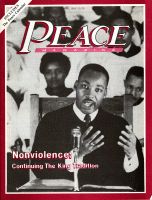
Peace Magazine April 1985, page 23. Some rights reserved.
Search for other articles by Helen Spiegelman here
VANCOUVER -- On March 1, 1985, a Canadian Support Network for the Nuclear-Free and Independent Pacific movement held its second annual meeting in Vancouver. The meeting was held to establish priorities for Canadian support groups in light of recent developments in the Pacific region.
The Support Network, which was formed one year ago, is part of an indigenous response to the severe problems caused in the South Pacific by foreign powers pursuing their own military interests.
Entire populations have been "relocated" from their ancestral homes to make room for atomic tests and military exercises. Generations of Marshall Islanders suffer from the effects of radiation exposure. Fishing grounds have been contaminated, and coral reefs destroyed, by underground atomic testing. China, the Soviet Union and the United States all use the Pacific Ocean as a target for ICBM tests.
The Nuclear Free and Independent Pacific (NFIP) movement seeks to establish the entire region as a nuclear free zone, and to support movements for self-determination in such territories as Belau and New Caledonia. Based in Vanuatu, this organization has a Pacific Concerns Resource Center in Hawaii which issues urgent appeals to international sup porters and publishes the Pacific Bulletin four times a year.
In recent months, Japanese plans to dump radioactive wastes in the Pacific have been put on hold, in response to international petitions and islanders' pressures. In Belau, New Caledonia, East Timor, and West Papua, indigenous people are seeking self-determination with intense resistance from the US, France, and Indonesia.
The people of Belau have just had to vote a fifth time to reaffirm a clause in their new constitution banning nuclear materials from their territory, resisting repeated efforts of the US to pressure them to abandon the decision.
Along with Belau, the is lands of Fiji and Vanuatu have declared themselves nuclear-free. The recent decision of New Zealand to ban nuclear-capable warships from its ports is a milestone for the NFIP movement and will help to bring public attention to the region and to empower other nations to emulate such decisions.
With expanding trade between Canada and the Pacific Rim countries, Canadian military activity in the region is increasing. Canada participates in military exercises with the US and other countries, and the Canadian ports at Esquimalt and Nanoose Bay are visited by Tomahawk cruise-capable warships.
The Canadian Support Network is a loose information-sharing network. Participating Canadian organizations include Project Ploughshares, the Victoria-based South Pacific Peoples Foundation, CUSO, Greenpeace, the Coalition of First Nations, as well as peace and development groups within the United, Anglican, Catholic, and Mennonite churches.
The Network will sponsor a Canadian tour by two out standing NFIP spokesmen later this year. Belauan lawyer Roman Bedor and New Zealand peace researcher Owen Wilkes will travel across Canada for two weeks in October.
The Canadian NFIP Support Network is co-ordinated through the South Pacific Peoples Foundation. For further information on the Bedor/Wilkes tour, they can be reached at: 407-620 View St., Victoria, BC, V8W lJ6.

Peace Magazine April 1985, page 23. Some rights reserved.
Search for other articles by Helen Spiegelman here